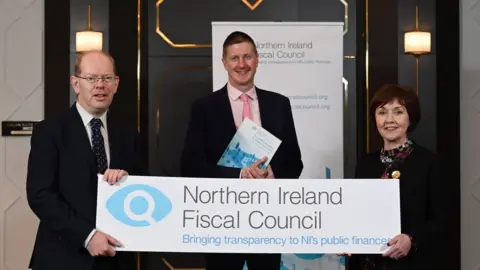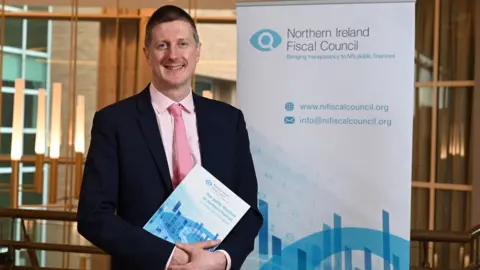Watchdog welcomes chance for three-year Stormont budget
 Michael Cooper Photography
Michael Cooper PhotographyThe head of Stormont's new tax and spending watchdog says ministers have a "golden opportunity" to agree a reforming three-year budget.
The Fiscal Council has been set up to increase transparency and scrutiny of NI's public finances.
Sir Robert Chote said a series of single-year budgets had "stymied long-term thinking and policy action".
A multi-year UK spending review means the executive can now produce its own multi-year spending plan.
A draft budget is expected to be published in the next few weeks.
It will then go out to public consultation before being considered by the assembly next year.
This will be the first Stormont budget to be scrutinised by the Fiscal Council, which will have a similar role to the UK Office for Budget Responsibility.
Sir Robert said it would aim to inform the public and assembly members (MLAs) about what the draft budget meant before final decisions were reached.
 Michael Cooper Photography
Michael Cooper PhotographyThe council has produced an analysis of what October's spending review means for Northern Ireland.
Stormont's Department of Finance and the Treasury are at odds on how generous the review was.
Chancellor Rishi Sunak said it represented the largest annual funding settlement for devolved governments since 1998.
But NI Finance Minister Conor Murphy said it would create "significant challenges".
The conflict is largely explained by the Treasury and Stormont using different baselines to compare the change in spending.
Sir Robert said this sort of tension was a common feature of devolved budget making.
"Our job in those areas is largely to make it transparent to see how people have reached those conclusions," he said.
He said the Fiscal Council's analysis showed that at both the NI level and UK level "you come out of the pandemic with a higher spending situation than when you went in."
But he added that when the NI block grant was examined as a share of the size of the economy then "the difference isn't enormous at the end of the three-year period."
The council has also produced what it hopes will be seen as a comprehensive guide to NI's public finances.
Sir Robert said: "The way decisions on spending and tax flow through the executive, the Treasury, Stormont and Westminster is sometimes a mystery even to those involved.
"Each year we have been asked to report on the executive's budget and the long-term sustainability of its finances, but we thought it would be sensible to start with a background guide that lays the groundwork for these."
